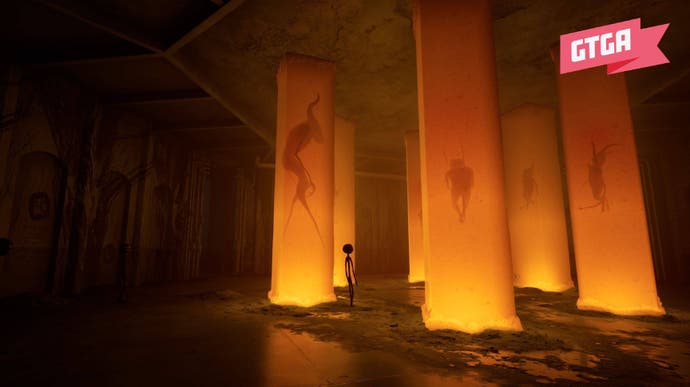Kid A Mnesia: Exhibition review - a striking audiovisual tour
Trippy down memory lane.
Editor's note: Hello! Over the next few days we're running a "Games That Got Away" series, where we finally get round to reviewing games that released at some point in 2021 but, for various reasons, we couldn't quite manage to cover at the time.
We've gone back to a few real gems, so for more catch-up reviews like this one head to the Games That Got Away hub, where all our pieces from the series will be rounded up in one convenient place. Enjoy!
The first thing the game Kid A Mnesia: Exhibition tells you is that it's not a game.
Even though it's published by Epic Games and is downloadable from the PlayStation and Epic Games stores, Kid A Mnesia isn't a game in the traditional sense, no, but that's why the additional subtitle "exhibition" offers a little helpful context here. A partnership between Epic and alt-rock band Radiohead, Kid A Mnesia is more a visual and aural experience than a traditional game, an interactive music video through which you can experience Radiohead's music alongside the trippy artwork of singer Thom Yorke and the band's long-standing cover artist, Stanley Donwood.
Your experience kicks off beneath the angry canopy of a 2D, hand-scribbled forest, the trunks of dark, broody trees stretching endlessly upwards towards a colourless sky, their limbs jutting off at acute angles to tangle with - and jab at - each other. In the distance burns a bright red fluorescent light but, well, that can't be the way I'm supposed to go, can it? Red means it's an exit, not an entry point - entryways typically glow green. Sometimes the colour red is even video game shorthand for "something scary is about to happen". Why on earth would I turn towards the scary red light when everything I know (read: not much) about codes and semiotics tells me I should be running from it?
That's the thing about Kid A Mnesia, though; the usual rules don't apply. Much like a traditional exhibition, you'll weave your way throughout the exhibits, casually glancing past some, stopping to actively interact with others. All have a touch of the strange and avant-garde about them. Your adventure takes you through a pleasing blend of different formats, encompassing the full gamut between chiselled wall markings and multimedia screens, lo-fi computer monitors and a chamber made entirely of scraps of paper, oscillating wildly from one concept to the other so you're never entirely sure what it is you're going to encounter in the next room.
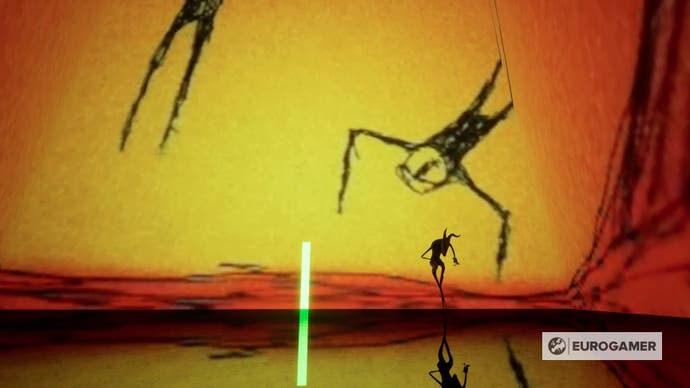
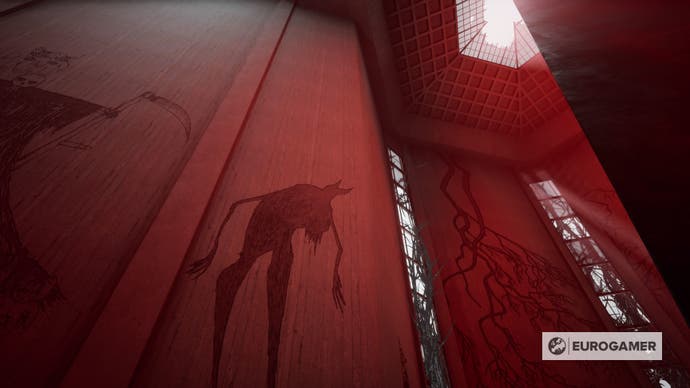
Despite what it insists, Kid A Mnesia is a game insofar as you decide where you want to go and when. Though it will, at times, strip that agency from you - some sequences, usually accompanied by full tracks from the album, are entirely on rails - you can decide the order in which you take in the exhibits, or double-back if you're curious about a shadowy incline you spotted. There are some recurring themes; a horned beast will frequently pop up to say hello, along with the periodical re-emergence of the concept of doors (The lyrics to Radiohead's "Pulk / Pull Revolving Doors" track take centre stage as you step into the exhibition space: there are doors in doors / and there are trapdoors / there are doors that open by themselves / there are sliding doors and secret doors / there are doors that let you in and out / but never open / and there are trapdoors / that you can't come back from). The route you take and the order in which you select those doors, however? That is yours to choose.
Perhaps unsurprisingly, the best part of the experience for me was the most "game-y" part, a segment where you follow the path of fiery words emblazoned upon the walls of a concrete room. Lose the thread - which is easy to do given you're in a confined space and you can have parts of six or seven different sentences on each wall - and the sequence will not be completed. It's here that the Pulk / Pull Revolving Doors lyrics make a reprisal too, but it goes much further than that, a full narrative revealed via a handful of words at a time that can only be completed if you carefully follow the trail to its end.
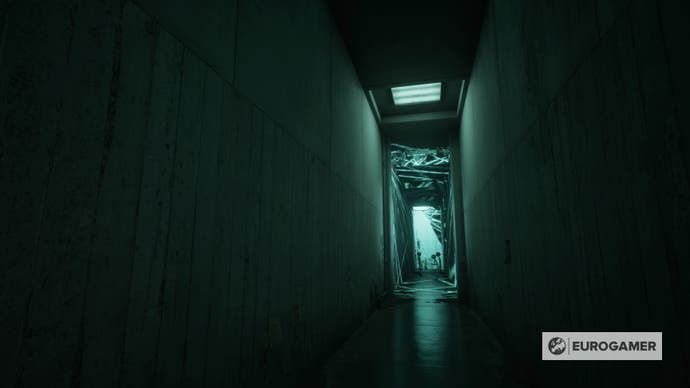
Other times, though, I felt frustratingly unhurried, and unable to make choices for myself. The pace at which you peruse the exhibits is agonisingly slow - presumably to ensure you listen to a certain percentage of each track before you exit - and there's no way to skip through the parts that interest you less, especially if you stumble into a scripted sequence that won't let you leave until you've experienced the entire track.
That said, there's no denying the skilful tension between the music and visuals, the latter of which stops short of "scary" but revels in the deep waters of "unsettling". Sometimes, it's unclear if the denizens closing in around you are friend or foe - and you might be too afraid to find out - but it's a fascinating and utterly novel way to peek into Yorke's creative mind and understand more about how Kid A Mnesia came about. No, I don't always know what it all means - as the game describes itself in the store descriptions, Kid A Mnesia is a "fevered dream-space, an edifice, built from the art and creatures, words and recordings of Radiohead's Kid A and Amnesiac uncovered from 20 odd years ago, reassembled and given new mutant life" - but it's a wild adventure, and "fevered" is certainly a fitting description here.
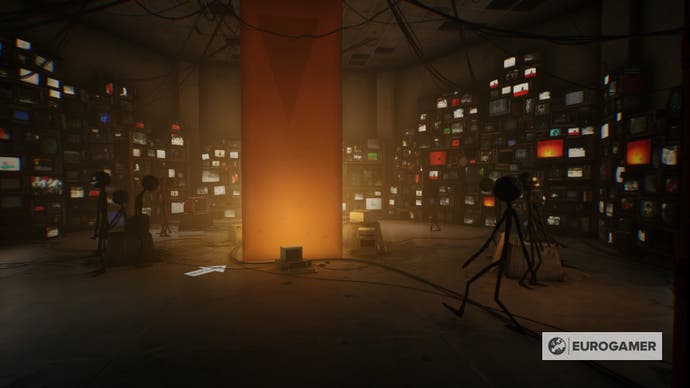
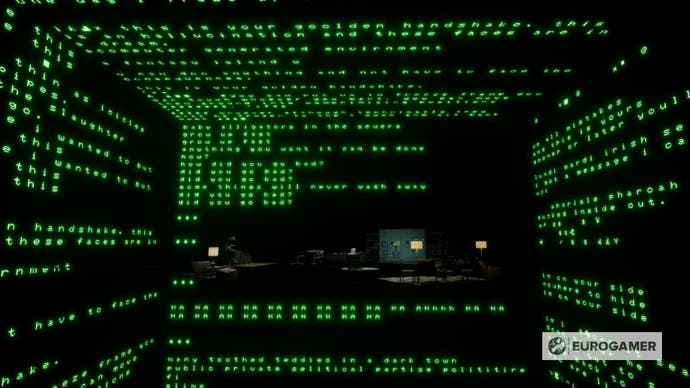
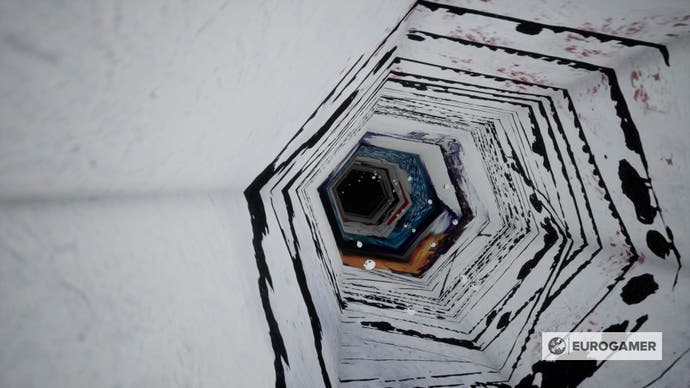
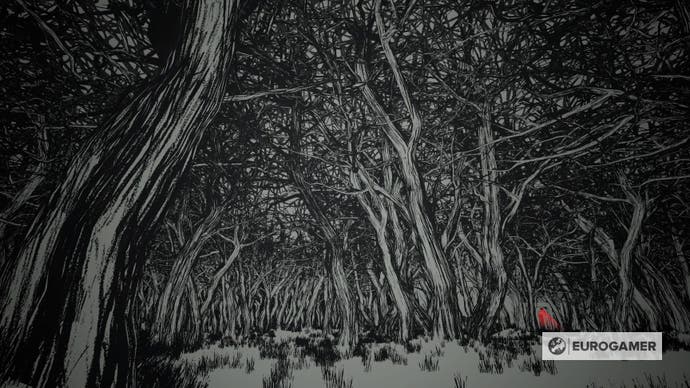
It's the soundtrack that dominates this experience, though, as you might well expect. Kid A released back in 2000 - and Kid A Mnesia in 2021 - but both albums share the same DNA and are achingly well realised by Yorke and Donwood's striking visual art. Consequently, if you're familiar with Radiohead, the various title tracks daubed upon the walls - In Limbo, Packt Like Sardines in a Crushd Tin Box, Ghost Chamber, The National Anthem - will likely make more sense to you than they did to me, but even if you're merely interested in modern art, Kid A Mnesia can be enjoyed by those less familiar with Radiohead's back catalogue, too, providing you don't mind being compelled to listen to a handful of tracks in their entirety.
I doubt many Radiohead fans will object, but those less enamoured with their music may find themselves frustrated by the lack of agency and control you have over your own destiny. Thankfully, as it takes just a couple of hours to explore the entire exhibition, you won't be forced to do anything for too long.
